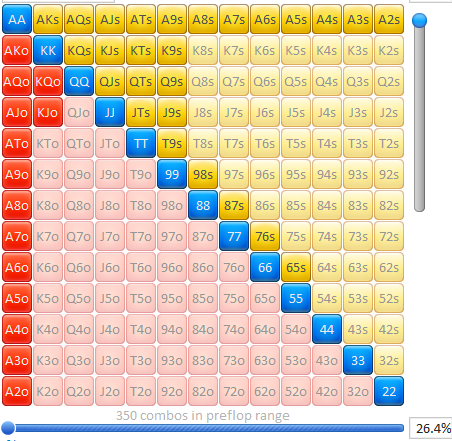A common leak for many of my cash game students is losing too much money in the blinds. I have four easy-to-use strategies below.
But before we get to those, let’s figure out if you have a blind playing leak.
🙋♂️ “How do I know this is a leak of mine?”
LIVE and online players: You feel you must defend your blinds, so you call with anything that might hit the flop. You often find yourself in “tough” post-flop spots after defending the blinds. You’re often confused on what to do after defending and you just check-call on the flop without a plan. Lastly, maybe you just know your blind losses are huge.
Online players: You have a blind leak if your win rate in the BB is worse than -100bb/100 hands and/or worse than -50bb/100 hands in the SB. This means that your blind playing tendencies of calling and raising are worse than just folding every blind hand.
If you’re losing too much in the blinds, it probably comes from calling too often.
The quickest way to fix this leak is to simply fold more! But you’ve probably developed a habit of calling, and it’s a tough habit to break.
So, let me give you four strategies that will help you break the bad blind calling habit and improve your results.
1. Realize that Blind Defense is NOT Necessary, and in Fact, it Could be Downright Disastrous
A lot of people think, “I’ve already put money in the pot, I can’t just give up on that!” So, they call to fight for that little bit they’ve put in. Keep this in mind: Blind money doesn’t belong to you; it belongs to the pot.
Realize also that your current blind defense decisions are causing your losses. If your big blind win rate is ugly, like -250bb/100 hands, your defense decisions are costing you 2.5x more than just folding every blind. This realization must spur you to change your strategies. You can’t keep on losing money like this and expect to be a winning player.
Lastly, realize what you’re saying when you defend the blinds: “I want to see the flop OOP, as the preflop caller, against this open raiser.” You must have a good reason to give your opponent a range and position advantage over you.
Once you realize how detrimental defending the blinds can be to you, it’s going to be easier to implement the next 3 steps.
2. Fold More Often
This is very easy to say, but difficult to do because of the blind defense habit of calling that you’ve probably developed.
Select good hands to defend the blinds with. Remember, you’re choosing to see the flop out of position vs an open-raiser (anti-Bread & Butter poker), so choose hands that flop well against an open-raiser’s range. Pocket pairs, suited connectors, strong Broadway hands and AX hands are generally good to call with.

Figure 1: Generally +EV hands to defend the blinds with calls and 3bets.
I recommend to stay away from most suited-gappers and especially any double-gappers or larger.
You have to train yourself to fold hands outside of the range above. It’ll be tough at first. But, force yourself to do it for the next 10 hours of play or 2,000 hands. If you just fold more like this, you’ll see improvements in your blind results, and that’s going to go a long way towards breaking your bad blind defense habits.
Given the defense range above, you should NOT defend all of those hands in the small blind. The reason is because your call doesn’t end the action. So, remove the weakest hands in the range from your small blind calls, or turn them into 3bet bluffs.
3. 3bet More
Decrease calls by turning more hands into value or bluff 3bets. You need to attack open-raisers with your best hands when they can call with worse, and you need to attack blind steals with bluff 3bets.
For value 3bets, your range will mostly be TT+ and AQ+. If you think about their 3bet calling range, and you believe they can call with many worse hands to give you value, make the value 3bet.
For bluff 3bets, you want to know your opponent can find a fold. He’s more likely to fold if you’ve seen him do it in the past (Raise/Fold to 3bet > 60%), if he’s opening from a steal position (CO, BTN and SB), or he’s generally a loose open-raiser.
Good 3bet bluffing hands have blockers to strong hands, but are also capable of flopping well. Suited and connected Aces like ATs and A5s are great, as they block some combinations of AA, TT, AK-AT, plus you have suited and connected Ace power!
Other good hands are at the bottom of your calling range, like 76s and K9s. They block some strong hands, but they have good sneak attack power on the right flops in case you get called.
4. Have a Plan to Steal BEFORE Calling
You’re going to fold more and 3bet more (#2 and #3 above), but you’ll still occasionally call. Let’s approach our calls with a new mindset:
“I will have a post-flop plan to steal BEFORE I call.”
A majority of your calling hands only flop top pair or the best draws like open-ended straight draw ~33% of the time. T9s flops TP+ and oesd+ only 35% of the time. KJo only 31% of the time. This means that 65% of the time or more, you’ll have to steal the pot post-flop in order to win. (Learn how to figure this out with my Flopzilla Pro Course).
So, before you click the CALL button with any hand, have a plan to steal the hand post-flop. Your plan should be based on your opponent, their tendencies and their raising range.
For example, you know that the open-raiser is flop honest and often checks behind on the flop. He seems to only bet with TP+ and nut draws. So, you can expect him to check most of the time. Easy steal! Check the flop, and after he checks-behind, fire the turn. Boom! With a plan in place and a solid blind defense hand, you’ve just improved your odds of making money with your call.
Put these four strategies to work over the next 10 hours or 2,000 hands and see the results. You won’t be disappointed.






